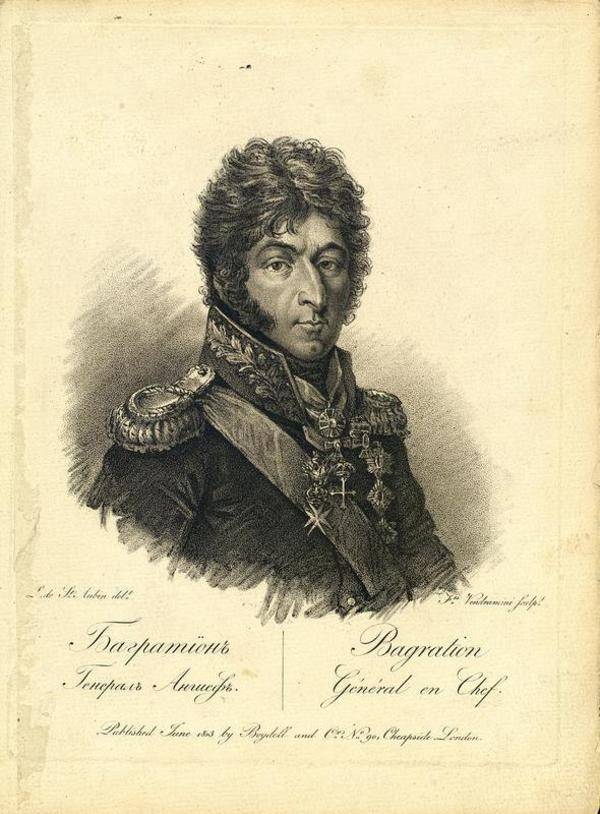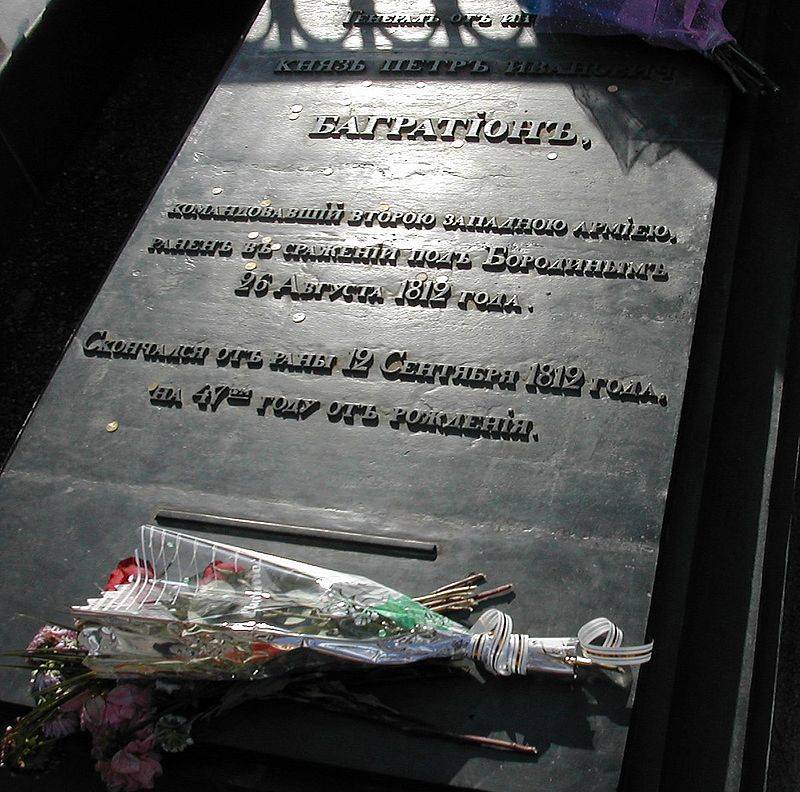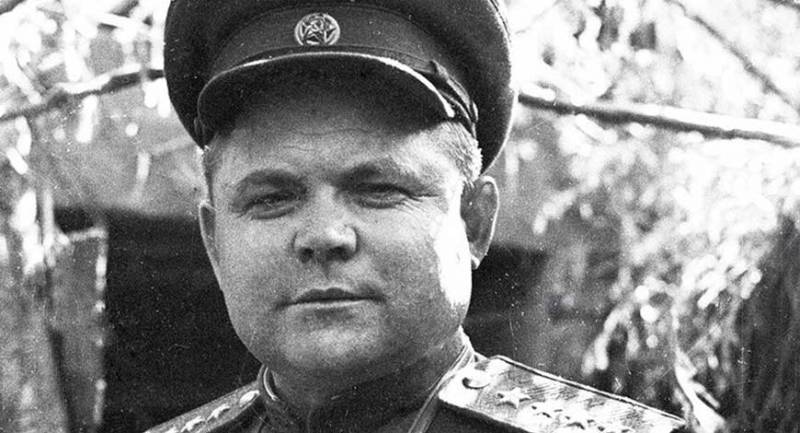The choice of immortality. The tragic death of Prince Peter Bagration

Causes of tragedy
As mentioned in the first partOn September 7, 1812, Prince Peter Bagration received a fragmentary wound on the left leg in the Borodino field with damage to the tibia or fibula, which led to blood loss and traumatic shock. The next few days, the circumstances were not for the wounded man in the best way - he had to constantly retreat in front of the enemy. Of the 17 days lived after being wounded, the prince spent on the road. This did not allow to conduct all medical procedures in a timely manner, and the constant shaking along the way exhausted Bagration a lot. However in historical There is an opinion among the environment that the main culprits are doctors with their unprofessional actions.
It is worth moving to the 1944st Belorussian Front in February 1, where Army General Nikolai Fedorovich Vatutin received a gunshot wound to his right thigh with bone damage. In principle, this was not a mortal wound for the middle of the 15th century; the injured could have been returned to duty in the event of a favorable combination of circumstances. In addition, the arsenal of military doctors of the Red Army already had antiseptics, methods of blood transfusion, coupled with local and general anesthesia. But, despite the fact that Stalin himself monitored the treatment, and the chief surgeon Nikolai Burdenko supervised the medical management, Vatutin died on April 10, XNUMX days after amputation. Will there be a fair reproach to the physicians of the beginning of the XNUMXth century who could not convince Bagration in time of the need for amputation and even just surgical intervention?
Serious psycho-emotional experiences were imposed on the general physical condition of the prince, associated not only with the forced abandonment of Moscow by the Russian army. Bagration was saddened by the fact that his foe Mikhail Barclay de Tolly actually saved his 2nd army. In addition, after being wounded, the commander of the army was first appointed General Miloradovich, and later Tormasov. At the same time, the order included the definition “to the highest decree”, that is, Bagration was not particularly expected after recovery. As it turned out, the prince was not in good relations with Emperor Alexander I, and following the results of the battle of Borodino, the ruler granted him only fifty thousand rubles. For comparison: Kutuzov after the battle became a general-marshal and received one hundred thousand rubles. And Prince Bagration did not even receive the money due, with his death, the emperor’s decree was abolished. Moreover, Alexander I behaved inappropriately when he actually forbade the burial of the military leader in St. Petersburg - relatives had to make a modest burial in the village of Simy.
Way east
Let us return to the moment when the wounded Prince Bagration was taken from the battlefield and evacuated to Mozhaisk under the blows of the advancing French. However, it was dangerous to stay here. The prince calls to himself the senior doctor of the Life Guards of the Lithuanian Regiment, Yakov Govorov, who gave him first aid on the battlefield and who will be destined to stay with Bagration until the end of his days. After a couple of years, Govorov will publish, based on the events of those days, the book "The Last Days of the Life of Prince Peter Ivanovich Bagration." It is noteworthy that in it the most characteristic moments will be extinct by the censor. Already on September 9-10, doctors using the prince during the Mozhaysk-Moscow transition discover unpleasant signs of an inflammatory process. At the same time, Yakov Govorov could not fully examine the prince’s wound - the wagon had to move quickly, the stops were short. The main danger was getting such a high-ranking military officer in French captivity. What would happen under such circumstances? Napoleon would do his best to save the wounded prince and would attract his best military doctor Dominic Larrey. This adherent of amputation of everything and everyone would surely deprive Bagration of his leg. In this state, Bagration would have come to some kind of festive reception at Napoleon, where he would have been awarded an honorary sword or saber. By the way, this already happened - in the case of the capture of Major General Pyotr Gavrilovich Likhachev. But do we know now who the general of the Russian army is Likhachev?

On September 12, the wagon with Bagration enters Moscow, where Governor-General Rostopchin meets the prince himself, at the request of whom he inspects another luminary of Russian medicine, Count Fedor Andreevich Guildenbrandt. He was a very experienced doctor who graduated from the school of military medicine in infantry battalions, and then served as chief surgeon at the Moscow Military Hospital. At the time of World War II, Fedor Andreevich was both a professor at Moscow University and a surgeon at the Main Military Hospital. After examining the wound, Guildenbrandt told the prince that “the wounds and health of your excellency are ordinary,” and he told those accompanying him: “... although the tibia of his leg was broken, but in Moscow the wound was very good and promised the salvation of a priceless military leader.”
At that time, for reasons beyond the control of the doctors, 48 hours had already been missed, during which it was necessary to conduct a thorough cleaning of the wound. It is from this moment that the infection begins to damage, and in this case, relying on the internal resources of the body was reckless.
In total, three doctors at once (there was still the chief physician of the 2nd Army I.I. Gangart) monitored the state of Bagration, to which the wounded addressed with a characteristic speech:
At the same time, Bagration did not leave his service and managed to accept many people, giving them instructions. Governor-General Rostopchin, who visited the prince in those difficult days, recalled that one of the reasons for refusing amputation could be Bagration's age - 50 years. It was believed in those days that blood was already spoiled by this age, the risks of surgery are very high. In addition, in the two days that the wounded general spent in Moscow, the flow of visitors was great and this did not allow him to choose the time to prepare for the operation. When they learned about the surrender of Moscow,
But, by and large, such a state of affairs should not cause panic among doctors — in the period before the antiseptic, all wounds healed through intense suppuration. As history has shown, not in this case ...
Last days in Sims
Bagration with his retinue and doctors leaves Moscow on a carriage on September 14 and heading for the Vladimir province in the village of Simy. This paradoxical fact still does not find a clear explanation. The whole army, along with Mikhail Kutuzov, retreated to the planned lines in the Ryazan province, where there were hospitals, and the seriously wounded prince decided to go the other way. Is he afraid of captivity? Severe depression and excruciating pain clouded the mind? Be that as it may, the next day the wound acquires signs frightening to doctors: the strong stench of separating pus or, as they used to say, “rotten fever”. In accordance with the rules adopted in those days, doctors again and with great zeal began to insist on amputation. We instructed Govorov, who spoke out:
Bagration refused. He was offered to at least give the go-ahead for the expansion of the wound for rehabilitation, but here they heard:
As a result, General Bagration ordered the treatment of rapidly developing sepsis with medication. In fact, this was limited only to the intake of ethereal tinctures of mauna with the Hoffmann anodine to soothe. All this led to the fact that already on September 16-17 the unfortunate passed the “point of no return”. Now, intoxication and infection of the body was not possible to stop even by amputation. Only on September 20 did Bagration succeed in persuading him to expand the wound, which, however, was already useless and only added suffering. At that time, the delayed surgical intervention caused osteomyelitis, sepsis and the development of anaerobic process. Over the next days, “Anton-fire spots with a lot of stench pus” appeared on the leg, and two days before his death Govorov observed worms in the wound.
“I noticed during this state,” Yakov Govorov wrote about the last days of the hero, “a gloomy longing that spreads across his face. Eyes gradually lost their last vigor, lips covered with blue, and sunken and withered cheeks with deadly pallor ... By evening, intensified nervous attacks with heavy breathing, wheezing and occasionally hiccups foretold the end of this great man. "
Surgeon Gangart was also under Prince Bagration, leaving his memories:
On September 24, 1812, General Peter Bagration died, having forever inscribed his name in the immortal regiment of the Fatherland.

Information